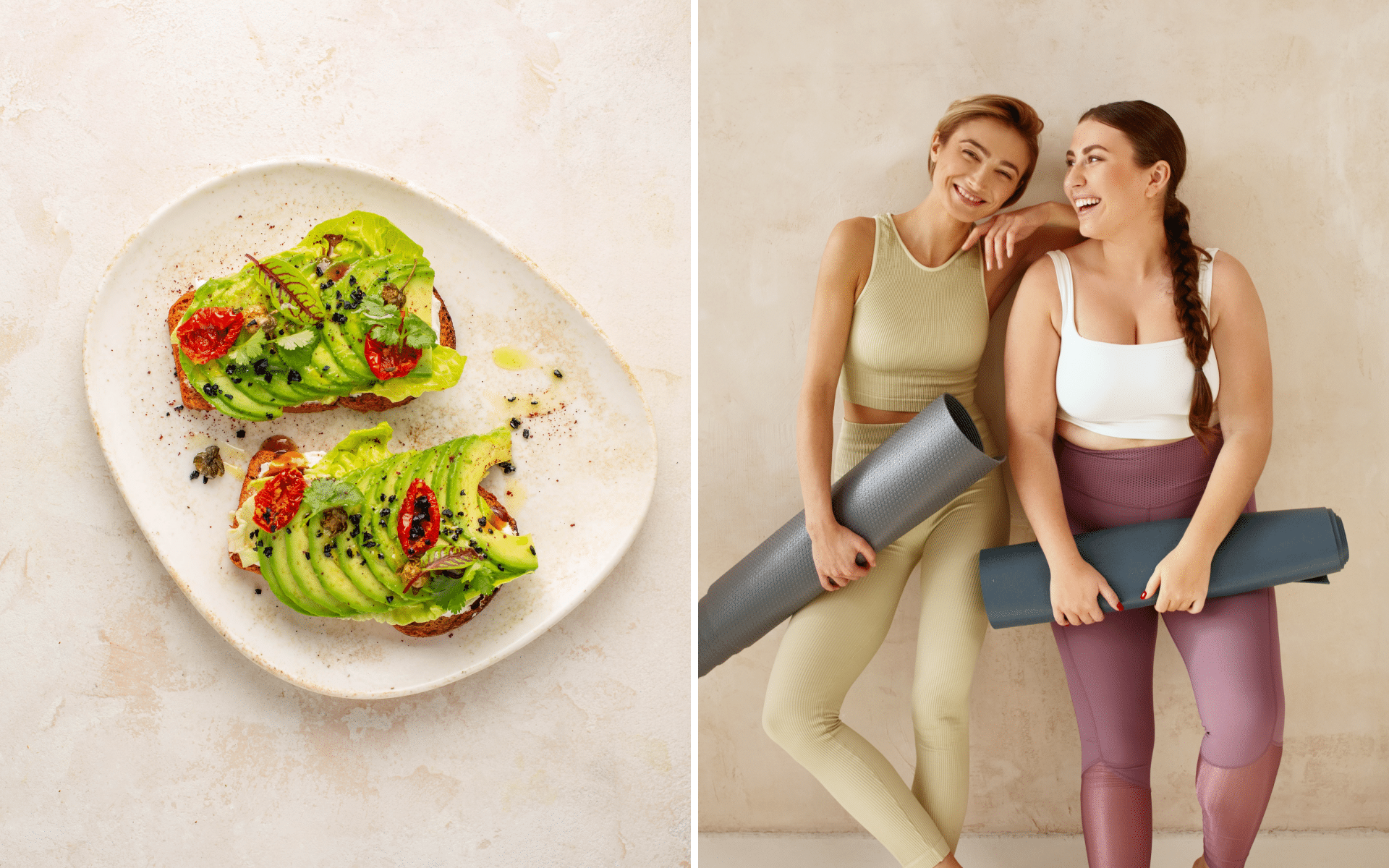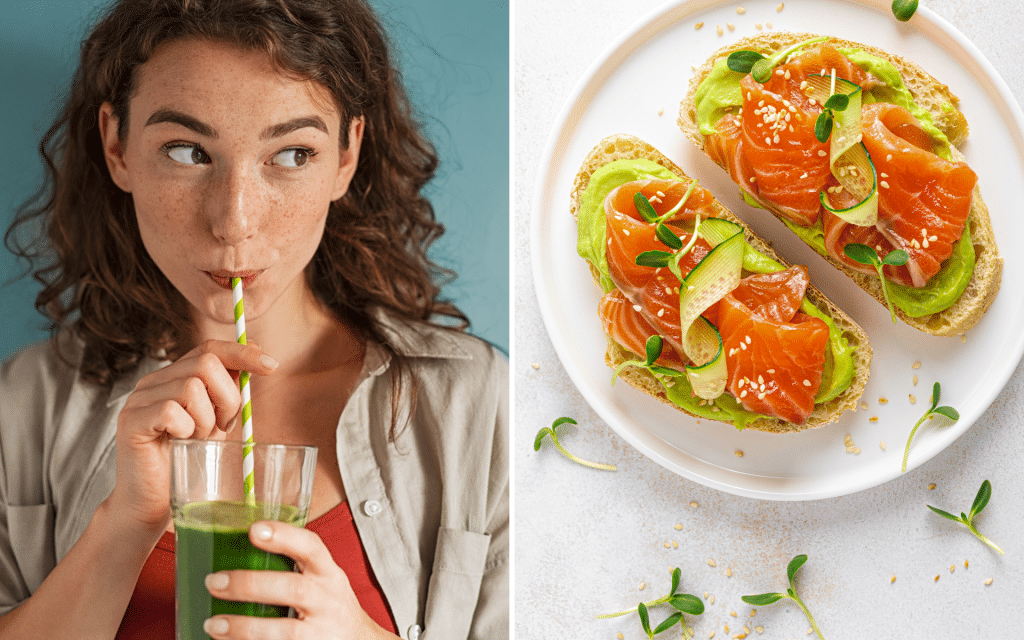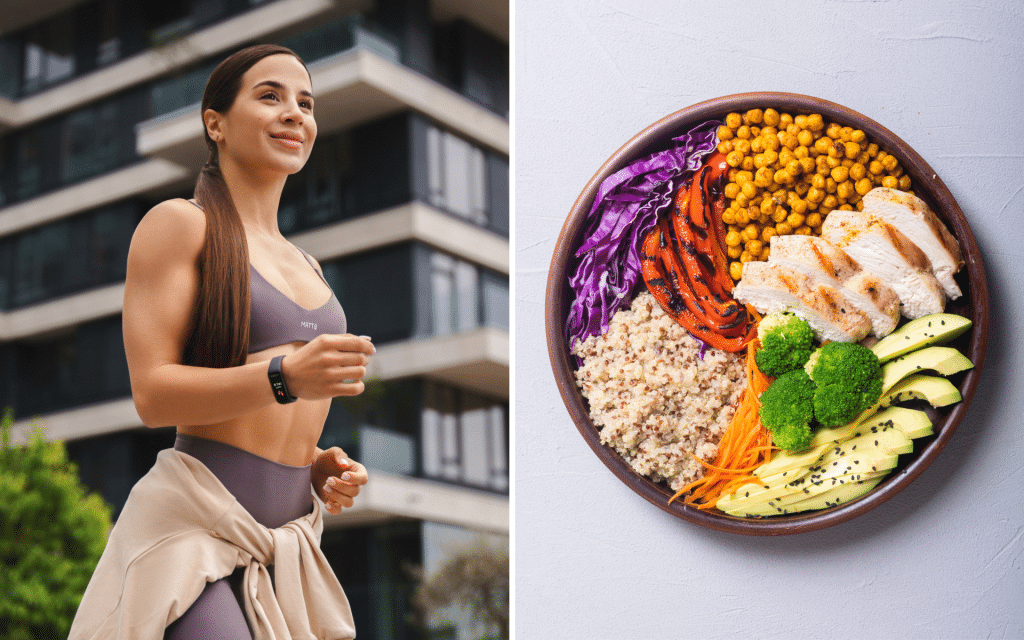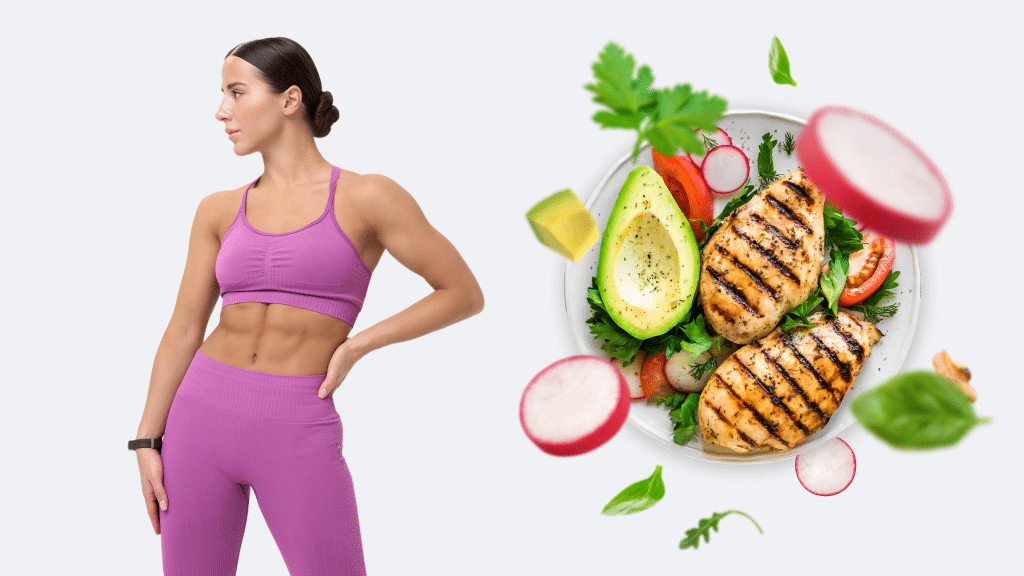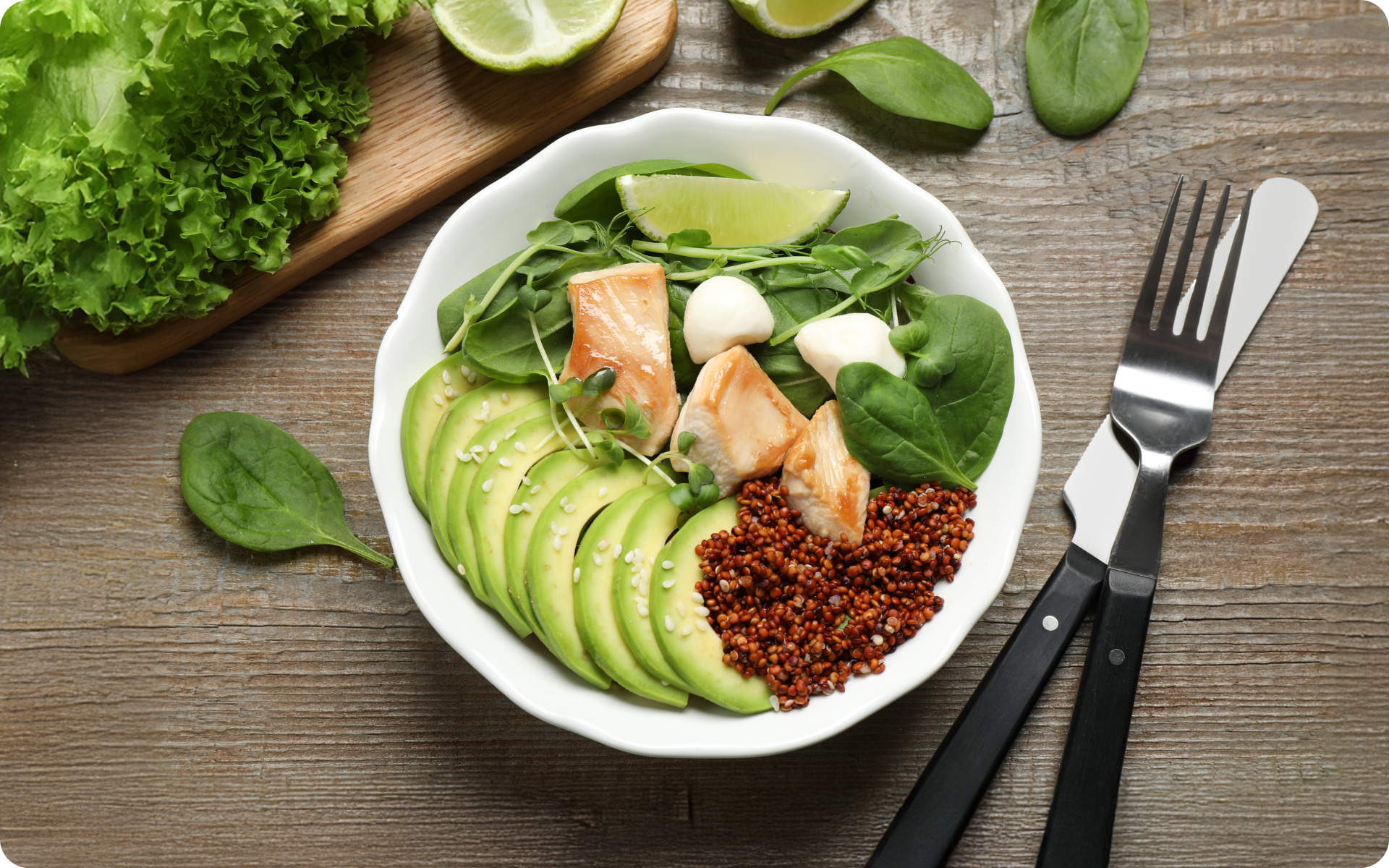A high-protein diet can have numerous benefits including increased satiety (feeling full), improved muscle mass and strength, and better weight management and fat loss, which can reduce the risk of obesity-related diseases such as diabetes and heart disease (1).
Knowing how much protein and what types of foods to eat can be overwhelming, especially for those who are following a 2,300-calorie meal plan. In this guide, we’ll break down everything you need to know about high-protein meals on a 2,300-calorie diet.
What Is a 2,300-Calorie Meal Plan High-Protein?
A 2,300-calorie meal plan high in protein is a dietary plan that includes meals and snacks totaling approximately 2,300 calories per day, with a high proportion of these calories coming from protein sources.
Protein is one of the three macronutrients that are essential for optimal health and functioning, the other two being carbohydrates and fats (2). Protein has numerous functions, including building and repairing tissues, producing enzymes and hormones, and supporting immune function (3). It can also be used for energy when carbohydrates are scarce.
While a general guideline recommends consuming 10-35% of your daily calories from protein, a high-protein diet typically consists of around 25-35% of your total daily caloric intake from proteins.
Read more: 7-day High Protein Meal Plan for Weight Loss and Muscle Gain
Sample 2,300-Calorie High Protein Meal Plan
Here’s a sample meal plan to give you an idea of what a typical day on a 2,300-calorie high-protein diet might look like:
Day 1 (226.8g Carbs; 60.6g Fat; 207.4g Protein )
Breakfast (778.3 Calories | 51.2g Carbs | 38.3g Fat | 56.2g Protein)
- 2 serving Simple Spinach Scramble (503.9 Calories | 13.6g Carbs | 37.5g Fat | 28.2g Protein)
- 2 cups (490 g) Nonfat yogurt (274.4 Calories | 37.6g Carbs | 0.9g Fat | 28.1g Protein)
Lunch (779.0 Calories | 102.9g Carbs | 9.1g Fat | 73.7g Protein)
- 2 Barbecue tuna sandwich (720.0 Calories | 89.1g Carbs | 8.7g Fat | 72.4g Protein)
- 2 large (144 g) Carrots (59.0 Calories | 13.8g Carbs | 0.3g Fat | 1.3g Protein)
Dinner (707.1 Calories | 72.7g Carbs | 13.2g Fat | 77.4g Protein)
- 1 serving Steamed Snapper with Ginger, Lime, and Cilantro (307.7 Calories | 6.3g Carbs | 9.8g Fat | 46.3g Protein)
- 2 medium (236 g) Banana (210.0 Calories | 53.9g Carbs | 0.8g Fat | 2.6g Protein)
1 serving Cottage Cheese and Strawberries (189.3 Calories | 12.5g Carbs | 2.6g Fat | 28.6g Protein)
Day 2 (166g Carbs; 110.8g Fat; 165.9g Protein)
Breakfast (653 Calories | 41.8g Carbs | 29.7g Fat | 53.5g Protein)
- 1 serving Vegetable 3 Egg Scramble (511 Calories | 33g Carbs | 29g Fat | 29g Protein)
- 1 cup (240 g) Nonfat Greek yogurt (142 Calories | 9g Carbs | 1g Fat | 24g Protein)
Lunch (840 Calories | 88.5g Carbs | 32.9g Fat | 54.2g Protein)
- 2 servings Apple Spice Protein Shake (475 Calories | 64g Carbs | 3g Fat | 49g Protein)
- 1 serving Sundried Tomato and Avocado Chopped Salad (365 Calories | 24g Carbs | 30g Fat | 6g Protein)
Dinner (811 Calories | 35.7g Carbs | 48.2g Fat | 58.1g Protein)
- 1 serving Parmesan Crusted Pork Chop (753 Calories | 21g Carbs | 48g Fat | 56g Protein)
- 1 serving Mediterranean Salad (59 Calories | 14g Carbs | 0g Fat | 2g Protein)
BetterMe: Health Coaching app helps you achieve your body goals with ease and efficiency by helping to choose proper meal plans and effective workouts. Start using our app and you will see good results in a short time.
Day 3 (196.9g Carbs; 121g Fat; 130g Protein)
Breakfast (680 Calories | 57.5g Carbs | 35.2g Fat | 38.9g Protein)
- 1 serving Spinach and Poached Egg Muffins (375 Calories | 38g Carbs | 15g Fat | 25g Protein)
- 1 serving Cinnamon Banana Mug Cake (305 Calories | 19g Carbs | 20g Fat | 14g Protein)
Lunch (679 Calories | 69.5g Carbs | 33.4g Fat | 35.5g Protein)
- 1 Serving Sunrise Smoothie (404 Calories | 47g Carbs | 12g Fat | 31g Protein)
- 1 serving Pepper Cucumber & Avocado Salad (275 Calories | 22g Carbs | 21g Fat | 5g Protein)
Dinner (947 Calories | 69.9g Carbs | 52.4g Fat | 55.6g Protein)
- 1 High-Protein Pita Pizza (722 Calories | 43g Carbs | 39g Fat | 51g Protein)
- 1 serving Pan-Fried Corn (225 Calories | 27g Carbs | 13g Fat | 5g Protein)
Is Protein or Calories More Important?
Both protein and calories play crucial roles in dieting, but their importance can vary depending on your specific goals.
- Calories: They are the primary measure of energy intake (4). To lose weight, you generally need to consume fewer calories than you burn (5). Managing your calorie intake is essential for weight control.
- Protein: It’s vital for muscle maintenance, repair, and growth (6). A higher protein intake can help increase satiety, reduce hunger, and preserve muscle mass during weight loss (7).
If your goal is weight loss, focusing on a calorie deficit while ensuring adequate protein intake is important. If you’re aiming to build muscle, a higher protein intake combined with a calorie surplus may be necessary. Balancing both according to your goals is key.
Calculating your macros involves determining the right amount of protein, carbohydrates, and fats you need to consume daily to meet your specific health and fitness goals.
Here’s a step-by-step guide:
Determine Your Caloric Needs
Calculate your total daily energy expenditure (TDEE), which is the number of calories you need to maintain your current weight. You can use online calculators that consider factors such as age, sex, weight, height, and activity level.
Set Your Goals
Decide if you want to lose weight, maintain your weight, or gain muscle. This will affect your total calorie intake. For weight loss, aim for a calorie deficit (8); for muscle gain, aim for a surplus (9).
Choose Your Macro Ratios
The recommended macronutrient distribution ranges are:
- 45-65% of calories from carbohydrates
- 10-35% of calories from protein
- 20-35% of calories from fat
Adjust these ratios within the ranges based on personal preferences and how your body responds. Some popular diets go outside these ranges, but we recommend discussing your health and nutrient needs with your healthcare provider before trying one of those.
Calculate Grams of Each Macro
- Protein: 1 gram = 4 calories
- Carbohydrates: 1 gram = 4 calories
- Fats: 1 gram = 9 calories
Multiply your total daily calories by the percentage for each macro, then divide by the calories per gram to get the grams needed.
Track Your Intake
Use a food diary or app to track your daily intake and ensure you’re meeting your macro goals.
Is 2,300 Calories a Day a Lot?
Whether 2,300 calories a day is considered a lot depends on several factors, including your age, sex, weight, height, activity level, and specific health goals.
For Active Individuals
For those who are very active or have a high level of physical activity, 2,300 calories may be necessary to maintain energy levels and support muscle growth or maintenance. It may even not be enough.
For Sedentary Individuals
If you live a sedentary lifestyle, 2,300 calories might be more than you need, potentially leading to weight gain if not balanced with physical activity.
For Weight Loss or Gain
If you’re trying to lose weight, 2,300 calories may be too high, unless you’re very active or have higher baseline needs. Conversely, if you’re trying to gain weight or muscle, it may be appropriate or even on the lower side, depending on your activity level and body size.
Ultimately, it’s important to tailor your caloric intake to your personal needs and goals.
How Much Protein Is on a 2,300-Calorie Diet?
The protein intake typically ranges from 25% to 35% of the total daily caloric intake on a 2,300-calorie high-protein diet. This means you consume approximately 575 to 805 calories from protein, which translates to about 144 to 201 grams of protein per day, given that each gram of protein provides 4 calories.
BetterMe will shake off your mental funk, rid you of your energy-zapping habits, and help you sculpt the body of your dreams. Intrigued? Hurry up and change your life for the better!
Is 2,300 Calories Enough to Build Muscle?
Whether 2300 calories is enough to build muscle depends on several factors, including your age, sex, weight, height, activity level, and overall metabolism. Here are some considerations:
- Activity Level: If you’re highly active and engage in regular strength training, you may need more than 2,300 calories to support muscle growth and recovery.
- Current Body Composition: If you have a higher body weight or muscle mass, your caloric needs may be greater to continue building muscle.
- Metabolism: Individuals with a faster metabolism may require more calories to gain muscle compared to those with a slower metabolism.
- Protein Intake: Ensuring adequate protein intake is essential for muscle building (6). Make sure enough of your calories come from protein to support muscle repair and growth.
- Caloric Surplus: To build muscle, you generally need to be in a caloric surplus, which means you consume more calories than you burn. Whether 2,300 calories is sufficient depends on your TDEE and how much of a surplus you need.
It’s often helpful to track your progress and adjust your caloric intake as needed. Consulting a registered dietitian or fitness professional can provide personalized guidance based on your specific goals and body composition.
Read more: Gamify Exercise: How to Turn Exercise Into Play
Is it Possible to Burn 2,300 Calories a Day?
For highly active individuals, such as athletes or those with physically demanding jobs, burning 2,300 calories daily may be quite feasible.
However, for someone who lives a sedentary lifestyle, reaching this level of calorie burn would require significant changes, including increased physical activity and possibly dietary adjustments.
Get your personalized
meal plan!
Here are some considerations to determine if it’s reasonable for you:
- Current Activity Level: If you’re already active, you may be closer to this goal than someone who is not active.
- Health and Fitness Goals: If you’re aiming for weight loss or improved fitness, increasing your calorie burn can be beneficial, but it should be done safely and sustainably.
- Time and Commitment: Achieving this level of activity requires time and dedication. Consider whether you can realistically incorporate the necessary activities into your daily routine.
- Physical Condition: Ensure that your body can handle the increased activity level without risk of injury. Consulting your healthcare provider and a fitness professional can help tailor a plan to your needs.
If you don’t hit your protein goal, several things can occur, depending on your activity level and overall diet. Protein is essential for maintaining muscle mass, particularly if you exercise regularly. Insufficient protein intake may result in muscle loss, decreased strength, and slower recovery from workouts (10). In addition, protein plays a key role in satiety and metabolism. Therefore, not consuming enough protein may lead to increased hunger and potential weight gain due to overeating. It’s essential to balance protein intake with your caloric and nutritional needs to support overall health and fitness goals. However, there is a big difference between missing your protein goal by a few grams and consistently getting too little protein. You don’t need to be too precise, as long as you’re close to your target most of the time. Whether you should count calories or just protein depends on your specific health and fitness objectives. Counting calories can be helpful if you aim to control weight, ensuring you consume fewer calories than you burn for weight loss or helping maintain a balance for weight maintenance (11). However, it’s not required and isn’t healthy for everyone. Focusing on protein is crucial for muscle maintenance and growth, especially if you’re active or trying to build muscle. Ideally, a combination of both approaches is recommended: monitor your total caloric intake to manage your weight while ensuring sufficient protein intake to support muscle health and satiety. If this feels overwhelming, there are strategies to reduce calories and increase protein intake without counting calories or grams. Whether you gain weight by eating 2,300 calories a day depends on your individual caloric needs, which are influenced by factors such as age, sex, weight, height, and activity level. For some, 2,300 calories may be a maintenance level, while for others, it may lead to weight gain. Highly active individuals or those with a higher metabolic rate may maintain or even lose weight at this intake level. Conversely, sedentary individuals may gain weight if they consume more calories than they burn (12). It’s important to tailor your caloric intake based on your personal energy expenditure and health goals. If you’re vegan, check out our High-Protein Vegan Foods guide for healthy protein-rich plant-based foods. The term “90/30/50 diet” does not correspond to a widely recognized or standardized dietary plan. It may refer to a specific meal plan or macro distribution tailored to an individual’s needs or goals. Typically, such ratios can be used to describe macronutrient distribution—for example, 90 grams of protein, 30 grams of fat, and 50 grams of carbohydrates per day. However, without specific context, the exact meaning of a 90/30/50 diet can vary. It’s advisable to customize any diet plan based on personal nutritional requirements and objectives, possibly with the guidance of a registered dietitian.Frequently Asked Questions
What happens if I don’t hit my protein goal?
Should I count calories or just protein?
Will I gain weight if I eat 2,300 calories?
What is a 90/30/50 diet?
The Bottom Line
A 2,300-calorie high-protein meal plan offers significant benefits, including enhanced satiety, improved muscle mass, and effective support for muscle repair and growth. This type of diet is particularly beneficial for active individuals or those who are looking to build and maintain muscle. However, it’s essential to customize the meal plan to align with your personal health goals and nutritional needs. Consulting a registered dietitian can help ensure the diet is balanced and effective for achieving optimal results.
DISCLAIMER:
This article is intended for general informational purposes only and does not serve to address individual circumstances. It is not a substitute for professional advice or help and should not be relied on for making any kind of decision-making. Any action taken as a direct or indirect result of the information in this article is entirely at your own risk and is your sole responsibility.
BetterMe, its content staff, and its medical advisors accept no responsibility for inaccuracies, errors, misstatements, inconsistencies, or omissions and specifically disclaim any liability, loss or risk, personal, professional or otherwise, which may be incurred as a consequence, directly or indirectly, of the use and/or application of any content.
You should always seek the advice of your physician or other qualified health provider with any questions you may have regarding a medical condition or your specific situation. Never disregard professional medical advice or delay seeking it because of BetterMe content. If you suspect or think you may have a medical emergency, call your doctor.
SOURCES:
- Clinical Evidence and Mechanisms of High-Protein Diet-Induced Weight Loss (2020, ncbi.nlm.nih.gov)
- Nutrition: Macronutrient Intake, Imbalances, and Interventions (2023, ncbi.nlm.nih.gov)
- Physiology, Proteins (2022, ncbi.nlm.nih.gov)
- Calories (2022, ncbi.nlm.nih.gov)
- Understanding calories (2023, nhs.uk)
- Dietary Protein and Muscle Mass: Translating Science to Application and Health Benefit (2019, ncbi.nlm.nih.gov)
- The role of protein in weight loss and maintenance (2015, sciencedirect.com)
- Optimal Diet Strategies for Weight Loss and Weight Loss Maintenance (2021, ncbi.nlm.nih.gov)
- Is a Caloric Surplus Necessary to Build Muscle? (2020, medicinenet.com)
- Dietary protein – its role in satiety, energetics, weight loss and health (2012, cambridge.org)
- Will counting calories help you to lose weight? (2022, bhf.org.uk)
- Why people become overweight (2019, health.harvard.edu)
